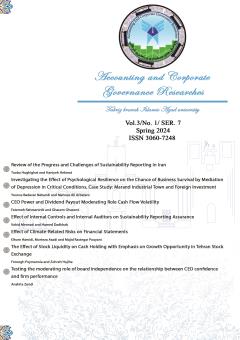The impact of climate-related risks on financial statements
Subject Areas : Financial accounting
Elham Hamidi
1
![]() ,
Morteza Asadi
2
,
Majid Rastegar Pooyani
3
,
Morteza Asadi
2
,
Majid Rastegar Pooyani
3
1 - Assistant Prof, Department of Accounting, Faculty of Management and Finance, Khatam University, Tehran, Iran.
2 - MSc. in Accounting, Faculty of Management, University of Tehran, Tehran, Iran
3 - PhD in Accounting, Faculty of Management and Economics, Tarbiat Modarres University, Tehran, Iran.
Keywords: climate-related risks, international financial reporting standards, materiality, judgment,
Abstract :
As the world faces increasing environmental and social challenges, the demand for reliable and transparent sustainability reporting has increased significantly and has shifted dramatically from voluntary to mandatory reporting. In this regard, in November 2021, the Trustee[1] of the International Financial Reporting Standards Foundation announced the formation of the International Sustainability Standards Board[2] with the aim of developing high-quality, global and comprehensive sustainability disclosure standards in order to meet the information needs of investors. And in June 2023, the International Sustainability Standards Board published International Sustainability Financial Reporting Standard 1 on General Requirements for Sustainability-Related Financial Disclosures and International Sustainability Financial Reporting Standard 2 on Climate-Related Disclosures. The immediate impact of climate-related issues on the financial statements may not necessarily be quantitatively significant, but entities' stakeholders expect the entity to explain how it considers climate-related issues in the preparation of the financial statements and the major assumptions, estimates and judgments involved. One of the concerns of stakeholders is the uneven application of international financial reporting standards published by the International Accounting Standards Board for climate-related risks and the disclosure of insufficient information about these risks in financial statements. In this article, by examining the effects of climate-related issues on financial statements, an attempt is made to alleviate the concerns of stakeholders in this area.
Antoniuk, Yevheniia. 2023. “The Effect of Climate Disclosure on Stock Market Performance: Evidence from Norway.” Sustainable Development 31(2): 1008–26.
Bansal, Ravi, Dana Kiku, and Marcelo Ochoa. 2016. Price of Long-Run Temperature Shifts in Capital Markets. National Bureau of Economic Research.
Board, Financial Stability. 2017. “Recommendations of the Task Force on Climate-Related Financial Disclosures.”
———. 2019. “Task Force on Climate-Related Financial Disclosures: 2019 Status Report.”
Bui, Binh, and Carolyn J Fowler. 2019. “Strategic Responses to Changing Climate Change Policies: The Role Played by Carbon Accounting.” Australian Accounting Review 29(2): 360–75.
Haque, Shamima, and Craig Deegan. 2010. “Corporate Climate Change‐related Governance Practices and Related Disclosures: Evidence from Australia.” Australian accounting review 20(4): 317–33.
Herbohn, Kathleen, Paul Dargusch, and John Herbohn. 2012. “Climate Change Policy in Australia: Organisational Responses and Influences.” Australian Accounting Review 22(2): 208–22.
Hlavinka, Petr et al. 2009. “Effect of Drought on Yield Variability of Key Crops in Czech Republic.” Agricultural and forest meteorology 149(3–4): 431–42.
Kerber, R. 2017. “Vanguard Seeks Corporate Disclosure on Risks from Climate Change.” Reuters https://br. reuters. com/article/us-vanguard-climate-idUSKCN1AU1KJ (14 August 2017).
KPMG, I. 2013. “The KPMG Survey of Corporate Responsibility Reporting 2013.” KPMG International Zurich, Switzerland.
McGowan, Michael, and Lisa Cox. 2019. “Court Rules out Hunter Valley Coalmine on Climate Change Grounds.” The Guardian 8.
Mercer, L L C. 2015. “Investing in a Time of Climate Change.” London, UK: Mercer International Finance Corporation and the UK Department for International Development.
Ndlovu, S. 2018. “Climate Change: The Impact on the Mining Sector.” Journal of the Southern African Institute of Mining and Metallurgy 118(4): vii–vii.
Peel, Jacqueline, Hari Osofsky, and Anita Foerster. 2017. “Shaping the’next Generation’of Climate Change Litigation in Australia.” Melb. UL Rev. 41: 793.
Schneckenburger, C, and Robert Aukerman. 2002. “The Economic Impact of Drought on Recreation and Tourism.” In Proceedings from the Colorado Drought Conference: Managing Water Supply and Demand in the Fime of Drought, , 93–97.
Schulten, Ashley, Andre Bertolotti, Peter Hayes, and Amit Madaan. 2021. “Getting Physical: Scenario Analysis for Assessing Climate-Related Risks.” In World Scientific Encyclopedia of Climate Change: Case Studies of Climate Risk, Action, and Opportunity Volume 3, World Scientific, 211–17.
Simnett, Roger, and Michael Nugent. 2007. “Developing an Assurance Standard for Carbon Emissions Disclosures.” Australian Accounting Review 17(42): 37–47.
Skaife, Hollis Ashbaugh, Daniel W Collins, William R Kinney Jr, and Ryan LaFond. 2008. “The Effect of Sox Internal Control Deficiencies on Firm Risk and Cost of Equity.” Journal of Accounting Research, Forthcoming.
Skinner, Douglas J. 1994. “Why Firms Voluntarily Disclose Bad News.” Journal of accounting research 32(1): 38–60.
Sullivan, Rory. 2014. “Climate Change: Implications for Investors and Financial Institutions.” Available at SSRN 2469894.
Taylor, Nick. 2023. “‘Making Financial Sense of the Future’: Actuaries and the Management of Climate-Related Financial Risk.” New political economy 28(1): 57–75.
Truong, Cameron, Mukesh Garg, and Christofer Adrian. 2020. “Climate Risk and the Price of Audit Services: The Case of Drought.” Auditing: A Journal of Practice & Theory 39(4): 167–99.
Winden, Andrew W. 2021. “Jumpstarting Sustainability Disclosures.” Bus. LAw. 76: 1215–21.
World Economic Forum, weforum. 2019. “The Global Risks Report.” In World Economic Forum Geneva, Switzerland.


